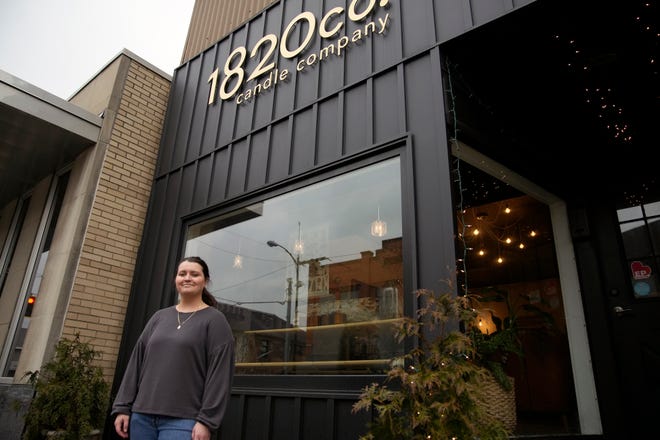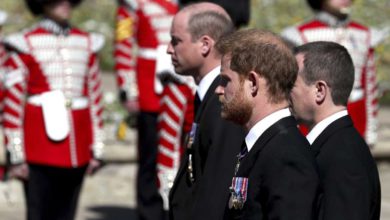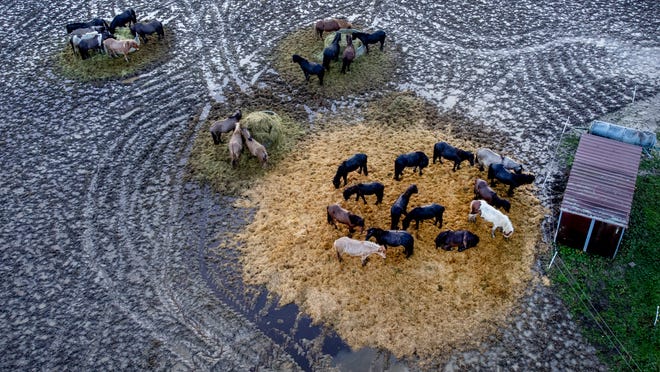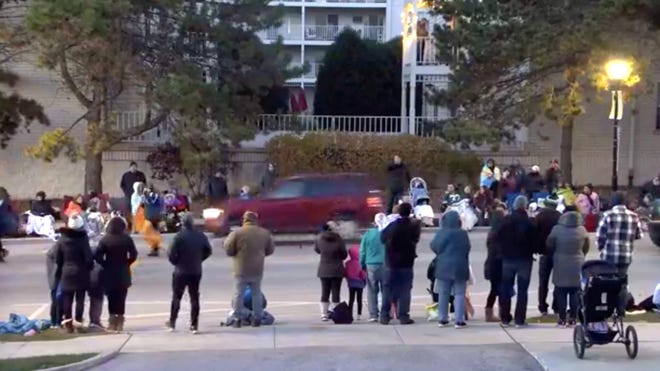

EAST PALESTINE, Ohio − Atop a hill near the Pennsylvania border, where her family farmhouse sits, Sidney Smith stared up at a fiery orange sky.
As smoke filled the air, she was curious and mystified. More than anything, she feared what would come next.
A train carrying hazardous materials had derailed a quarter mile from the house, near the center of town. And an explosion lit up the sky.
"I just thought to myself, 'I've never seen anything like this in my life,'" Smith recalled of the Feb. 3 incident.
Even then, before the extent of the damage was clear, Smith worried what this would mean for her town, for her family, for the life she intended to build here with her fiancé.
Two months later, she’s still worried.
'We want to get back to normal:'Residents face long road ahead in East Palestine
East Palestine:7 CDC workers fell ill investigating train derailment
The derailment didn't cause any injuries that night, but some train cars were carrying dangerous chemicals. A spill of those chemicals, followed by a controlled chemical burn, released toxins into the air, water and soil in and around East Palestine.
In the weeks since the toxic derailment, East Palestine residents have seen their businesses lose customers, faced blowback online for trying to get back to normal, and watched real estate values fall, leaving some stuck in homes they’d like to sell.
Many others have wondered if it was safe to stay in their beloved village, long term.
"It scares me thinking, if I want to have kids in the next couple of years, will I get them sick by having them live here?" said Smith, who will marry her fiancé, Eric Diaz-Guy, next year.

A daily disruption
Many in East Palestine are asking similar questions. The fire and smoke may be gone, but they’ve been replaced by fear and uncertainty.
The disaster has complicated daily life and decisions for everyone here, whether they want to stay, like Smith, or leave, like some of her neighbors.
Smith can trace her lineage in East Palestine back to 1918, when her ancestors bought a farmhouse that had been built in 1820. Her great grandfather and grandfather started Parker Dairy, which they ran for years.
In the 1980s, they got out of the dairy business to focus on crops and cattle. Then the house was empty for a while until Smith's parents moved back to the farm and it became Smith's family home as a child.
The farm and, more broadly, the village, are all she's ever known.
"I've never thought of myself being anywhere else," Smith said of East Palestine. "This is where I grew up. This is where my ancestors grew up. And this whole town is pretty much family."
Smith went to college to become a nurse. But after taking a few business classes, she found that she had a new passion. Since she was in middle school, she had been helping out at her mom Melissa's candle shop, 120 Candle Co., which she started in 2004.
Then, she gradually took on more responsibilities. When she graduated college, she wanted to take all she had learned and go all in on her mom's business. They currently run the shop together and have grown the business to the point where they receive online orders from all over the country.
"I love it, it's such a unique job," Smith said. "Not a lot of people can say 'I make candles for a living.' And to do it with your mom, is one of the most special things ever."
But like many other businesses in East Palestine, getting back to normal has been difficult. Business owners have faced some backlash online for re-opening their shops as the aftermath of the derailment unfolds. Posts on social media often come with comments accusing local businesses of being irresponsible by bringing customers to a contaminated area even though state officials have assured the public that the water and air are safe.
"A lot of people want to assume we're villains for wanting people to come here and shop," Smith said. "It's our livelihood. My parents have invested a lot of money in being here. We wouldn't tell our customers to come down here if it wasn't safe or we didn't personally feel safe."
In the weeks since the derailment, Smith said she's felt better about staying in East Palestine, long term.
"I have a lot of friends and family here and I don't want to leave them behind," she said.
Many other families, however, are considering other options.
More than two-thirds of homes in East Palestine are owner-occupied. Local realtors say the derailment has caused many challenges for people trying to sell their homes. And at least one insurance company, Allstate, has stopped offering coverage to new homeowners.

Norfolk Southern so far hasn't committed to compensating homeowners for diminished property values. At a CNN town hall in late February, the company's chief executive officer was confronted by a resident who fears he's stuck with his house forever.
“You burned me,” resident Jim Stewart said at the town hall. “We were going to sell our house. Our value went phoom,” he added while pointing his hands downward.
T. "Preacher" Ross, a resident who lives near Market Street, fears the small village could lose a lot if people pack up and leave. As a village of less than 5,000 residents, East Palestine relies on all its small businesses and shops, he said.
"There's a rumor going around of a ghost town, and I know that because I started it," he said. "I've already surmised that if people are leaving and nobody is waiting to come in, and the population gets too small in this town, companies and businesses are going to get hit.
"It will become a question of who's going to bail and who won't."
Ross fears the derailment has caused a stigma that will, for a long time, cause travelers who may normally stop and shop while passing through East Palestine, to say “Oh no, this is toxic town,” before driving further to stop somewhere else.
"That's what creates a ghost town," he added. "I don't think it will ultimately be that bad, but it ain't good."
'What is best for us'

Last month, an activist team of lawyers, environmentalists, and experts led by Erin Brockovich added a community advocate to their team. That advocate, East Palestine native Jessica Conard, has been tasked with outreach in the community as they continue fighting through remediation, legal, and safety processes.
Conard said the tight-knit community has a "connection" and trust of each other. But that trust doesn't extend to government and certainly doesn't extend to Norfolk Southern. The community feels they've been lied to throughout the process.
"When we have all these big corporations and big names coming into town, it's hard to know who to trust," she said. "The information has not been transparent."
That mistrust has led residents into a cycle of constantly trying to sort out what is fact from fiction and whether things are better or worse than they've been led to believe. While trying to make sense of all the information they receive, many are also battling just to get through the day. Norfolk Southern began giving reimbursements to all residents of East Palestine as part of remediation efforts, but some have complained about how difficult the process is.
One man, Peter Fiest, said he hasn't been able to receive any reimbursements because he doesn't have any mail in his name at his address. He was unable to go to work as evacuations began Feb. 3. And months later, he's been unsuccessful in getting compensation.
"I had a letter stating that I stay there," Fiest said of a letter from his landlord he presented to the claim center. "I can't work. I don't got no money right now. It's hard."
Those daily battles are becoming a new normal. As remediation continues, home sales in East Palestine will likely suffer for a while, Michael Stevens, board president for the Youngstown Columbiana Association of Realtors told the Canton Repository. Homebuyers don't have confidence in buying in the village right now, he said. And that lack of confidence won't go away quickly.
Smith said her concerns have continually waned as time has gone by, but she's preparing in case that changes.
"As of right now we plan on staying here, but obviously keeping cautious of those things that could pop up that put a family at risk," Smith said. "You're constantly thinking about what is best for us."
Source link








